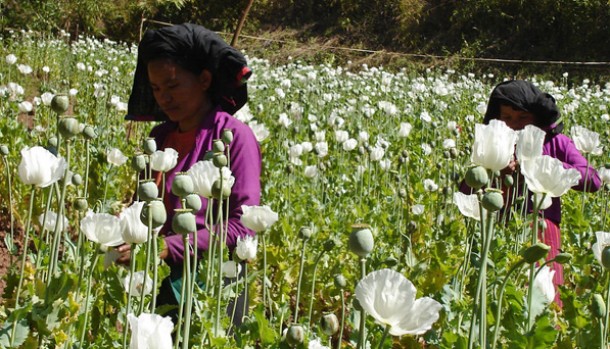RANGOON – Fighting government troops on one front, and opium cultivation on another, is no small challenge, says the army chief of the Ta’ang National Liberation Army (TNLA).
The armed rebel group of more than 1,500 troops adopted a policy last year to eradicate opium cultivation in their territory in east Burma, as addiction becomes an increasingly common problem among the ethnic Palaung people, who are also known as Ta’ang,
The policy, adopted in December, calls for a complete end to opium cultivation by 2017 in the Palaung area, but the armed group says it faces several challenges.
“A lot of our men have become opium addicts,” Tha Ho Palan, chief of the TNLA, told The Irrawaddy recently. “Even some educated youths have become addicts. We worry that all of our men will become addicted in the next few years. This is why we decided our armed troops should fight opium cultivation.”
In east Burma’s Shan State, where the armed group operates, the northern townships of Manton and Kutkai are known for growing opium poppies.
Tha Ho Palan, 37, said his troops have destroyed about 3,000 acres of opium poppy fields in the three townships. About 40 percent of the farmers responsible for their cultivation were Palaung, he said, while the rest were ethnic Chinese.
Drug addiction had fueled unemployment in the region, he said, with social problems arising in many communities.
“When men start using opium, their wives struggle to keep their families alive. Most housewives go to China and get [re]married there, and then children from those families become victims,” he said.
When the armed group initiated its anti-drug campaign, it faced some resistance, with critics pointing to the government army’s own failed attempt to eradicate opium cultivation in the state.
“Our people, including businessmen, told us from the beginning that we couldn’t stop opium cultivation,” Tha Ho Palan said. “After seeing that our troops were able to stop 75 percent of the cultivation in areas under our control, they support us a lot now.”
He said the Palaung troops had warned farmers not to grow opium and were continuing to destroy fields where the poppies were found.
“Opium is our enemy,” he said. “Our people have been killed silently, not from the shot of a gun, but from opium.”
Additional reporting by Kyaw Kha and Mongra.

















